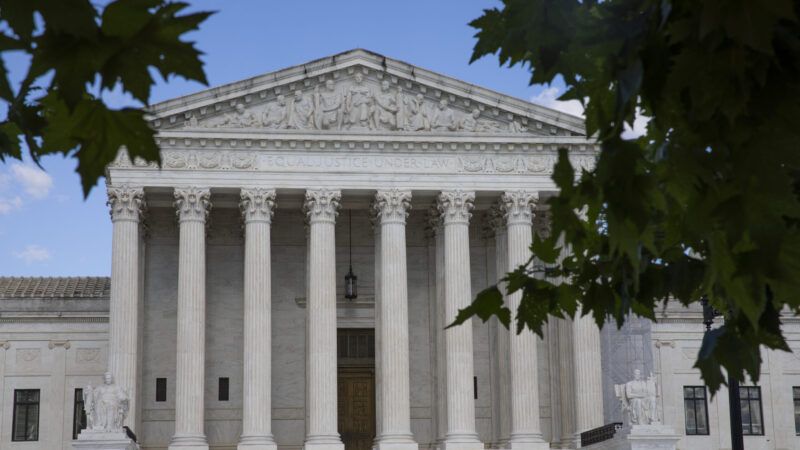Why the End of Chevron Could Be a Win for Immigrants
“Immigration is an area of the law where the partisan alignments break down over Chevron.”

On Friday, the Supreme Court overturned Chevron v. Natural Resources Defense Council, a 1984 ruling that gave government agencies broad discretion to interpret "ambiguous" laws. "Critics have long complained that Chevron deference allowed bureaucrats to usurp a judicial function and systematically disadvantaged 'the little guy' in disputes with an overweening administrative state," wrote Reason's Jacob Sullum of the Friday decision in Loper Bright Enterprises v. Raimondo and Relentless v. Department of Commerce.
The decision will impact the way agencies regulate fields such as environmental and public health policy. Broadly speaking, it's been celebrated on the right and criticized on the left. But "immigration is an area of the law where the partisan alignments break down over Chevron," says Michael Kagan, a law professor at the University of Nevada, Las Vegas, and director of the university's Immigration Clinic.
"We normally think of immigrant rights as part of the progressive coalition politically, and that coalition feared Chevron's demise," Kagan continues. "But Chevron was consistently bad for immigrants."
This was on Justice Neil Gorsuch's mind as he wrote his concurrence. Gorsuch described a case he heard as a court of appeals judge in which the Board of Immigration Appeals (BIA), the administrative body that applies and interprets immigration laws, "invoked Chevron to overrule a judicial precedent on which many immigrants had relied." The agency then tried "to apply its new interpretation retroactively to punish those immigrants," Gorsuch explained. "Our court ruled that this retrospective application of the BIA's new interpretation of the law violated" one of those immigrants' "due process rights."
"But as a lower court, we could treat only the symptom, not the disease. So Chevron permitted the agency going forward to overrule a judicial decision about the best reading of the law with its own different 'reasonable' one," he continued, "and in that way deny relief to countless future immigrants."
Immigration lawyers and analysts who spoke with Reason about the end of Chevron stressed that it might take years to see the full effects of Friday's decision and cautioned against viewing it as a massive win for immigrants. That said, it represents a significant shift in several areas of immigration policy.
"On balance, I think getting rid of Chevron will be a modest net plus for immigration liberalization," says Ilya Somin, a law professor at George Mason University and a contributor to The Volokh Conspiracy. "I think overruling Chevron could potentially constrain some executive attempts at immigration restriction, especially really sweeping ones, like some of the ones contemplated by [former President Donald] Trump, should he return to power."
But Somin notes there are "strictures" to keep in mind—and adds that Chevron "seemed to be used a bit less in the immigration field than some others."
David J. Bier, director of immigration studies at the Cato Institute, a libertarian think tank, says he's "skeptical" that the ruling "will have a major effect in most immigration areas." On "certain employment-based issues, it could have an effect, though not entirely positive," he explains. Optional Practical Training, a temporary period of employment related to an international student's course of study, "was just upheld on deference grounds," Bier points out.
Still, immigrants in certain legal situations could benefit from the end of Chevron. "In blunt terms, it made it easier for the government to deport people and it made it harder to win asylum for refugees fleeing really awful harm," says Kagan. "Chevron told federal judges to defer to people like [former Attorney General] Jeff Sessions, who was stridently anti-immigrant, or to the Board of Immigration Appeals, which has often leaned toward restrictionist interpretations of the immigration statutes."
One big factor in this conversation is the way U.S. immigration policy is made. "Congress has passed almost no immigration legislation in the past 20 years," says Greg Siskind, an immigration attorney and founding partner of Siskind Susser, but "presidents still have to administer the immigration system even as the legislation becomes more and more out of date." In practice, that means presidents have "gotten more and more creative in interpreting existing statute language to achieve their policy objectives in the absence of Congress playing a role."
Presidents "have issued an assortment of administrative rules and policies to implement those policies," Siskind continues—whether they're pro-immigration policies like former President Barack Obama's Deferred Action for Childhood Arrivals program or President Joe Biden's parole programs, or those implemented by former President Donald Trump "aimed at restricting legal immigration."
"Agencies will still be able to defend interpretations of ambiguous statutes, but they will need to provide a lot more evidence that their interpretation is consistent with the statute and a judge will have a lot more authority to disagree and impose his or her own view of what that statute means," adds Siskind. "So I expect both pro-immigration and anti-immigration plaintiffs to attack a variety of policies and for the courts to play a much bigger role in setting immigration policies for the country."
The Supreme Court's ruling on Chevron deference makes it all the more important for members of Congress to write clearly worded bills moving forward. (Of course, it remains to be seen whether Congress will actually do that.) That seems like an even bigger stretch for immigration bills, which Congress can't manage to pass in the first place.
"Chevron's demise is a win for conservatives, and for immigrants. It's important, and it may take time to understand its full importance," concludes Kagan. "But overall it's probably not the radical game changer that many people hope or fear it will be."


Show Comments (53)